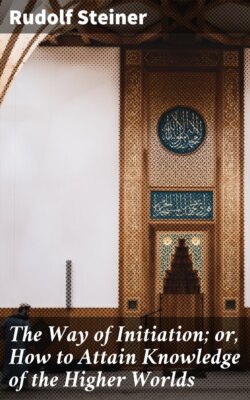The Way of Initiation; or, How to Attain Knowledge of the Higher Worlds

Реклама. ООО «ЛитРес», ИНН: 7719571260.
Оглавление
Rudolf Steiner. The Way of Initiation; or, How to Attain Knowledge of the Higher Worlds
The Way of Initiation; or, How to Attain Knowledge of the Higher Worlds
Table of Contents
THE PERSONALITY OF RUDOLF STEINER AND HIS DEVELOPMENT
II
III
IV
V
VI
VII
VIII
Отрывок из книги
Rudolf Steiner
Published by Good Press, 2019
.....
Beside this inner and contemplative life, his rational and philosophic mind was powerfully developing. From sixteen to seventeen years of age, Rudolf Steiner plunged deeply into the study of Kant, Fichte and Schelling. When he came to Vienna some years after, he became an ardent admirer of Hegel, whose transcendental idealism borders on Occultism; but speculative philosophy did not satisfy him. His positive mind demanded the solid basis of the sciences of observation. So he deeply studied mathematics, chemistry, mineralogy, botany and zoology. "These studies," he said "afford a surer basis for the construction of a spiritual system of the universe than history and literature. The latter, wanting in exact methods, would then throw no side-lights on the vast domain of German science." Inquiring into everything, enamored of high art, and an enthusiast for poetry, Steiner nevertheless did not neglect literary studies. As a guide therein he found an excellent professor in the person of Julius Schröer, a distinguished scholar of the school of the brothers Grimm, who strove to develop in his pupils the art of oratory and of composition. To this distinguished man the young student owed his great and refined literary culture. "In the desert of prevailing materialism," says Steiner, "his house was to me an oasis of idealism."
But this was not yet the Master whom he sought. Amidst these varied studies and deep meditations, he could as yet discern the building of the universe but in a fragmentary way; his inborn intuition prevented any doubt of the divine origin of things and of a spiritual Beyond. A distinctive mark of this extraordinary man was that he never knew any of those crises of doubt and despair which usually accompany the transition to a definite conviction in the life of mystics and of thinkers. Nevertheless, he felt that the central light which illumines and penetrates the whole was still lacking in him. He had reached young manhood, with its terrible problems. What was he going to do with his life? The sphinx of destiny was facing him. How should he solve its problem?
.....